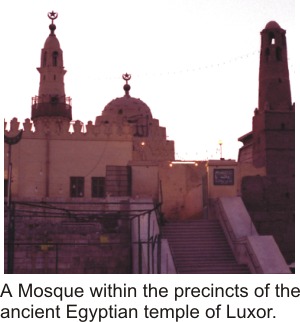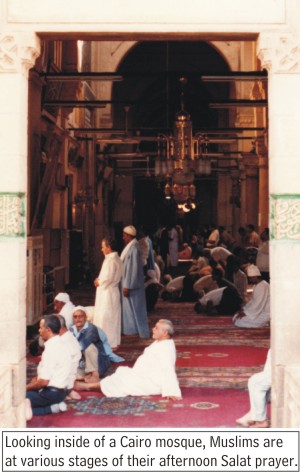
Home - Intro - Table of Contents - Hinduism - Buddhism - China - Judaism
Christianity - Aaron's Travels/Studies - Bibliography - Index - Bookstore
The purpose of my book is to discover the real world religions. I focus on the spirituality and look into possible problems that might lead to extremes. Islam has been and might well continue to be in the news. May the minor sections here do justice..
___________________________

Throughout Neighbors I have sought to avoid scholastic
skepticism and share some of the authentic spiritual power within a religion.
According to my research and spiritual experience of Islam, I’ll try to present
scriptures within their historical context.
Concerning the spiritual
context, Muhammad knew Jews and Christians. During his lifetime individuals and
groups espoused various views of Jesus. One group, Monophysites, flourished in
Egypt and Syria. They said Jesus Christ had only one nature that was divine.
Because these people completely associated the divine power of Jesus Christ with
God, it followed that the actual humanity and suffering of Jesus were only
apparent. Jesus was not actually crucified. The Crucifixion was an illusion.[3;
footnote below] Within the Koran Muhammad stated the view that the Crucifixion
was an illusion. For Muhammad it was blasphemous to associate anything with God,
especially to claim that a human being such as Jesus could be God or even equal
to God. Verses within the Koran clarify these particular elements.
"They say, 'We killed the Christ, Jesus son of Mary, apostle of God.' They did not kill him nor did they crucify him, though it appeared to them so. Those that disagree in the matter are lost in doubt. They have no knowledge about it other than conjecture, for surely God did not kill him. God raised him up to Himself. God is all-mighty and all-wise." (4:157-158)
"They are certainly unbelievers who say, 'God is the Messiah, the son of Mary.' For the Messiah had only said, 'O Children of Israel, serve God, who is my Lord and your Lord.' Whosoever associates others with God will have Paradise denied by God and shall be cast into hell. None shall help the evil-doers. They are certainly unbelievers who say, 'God is one person of the three.' There is but one God. If they do not desist from saying what they say, those of them that disbelieve shall suffer stern punishment." (5:72-73)
The Koran mentions Jesus in numerous scriptures. These elaborate on the mission and perceived distortions in Jesus’ ministry. It appears that during Muhammad’s lifetime, some of the Jesus stories in circulation were not included in the canonized New Testament of the Bible.
"God will say, 'O Jesus, Son of Mary, remember the favors I bestowed on you and your mother, when I strengthened you with the Holy Spirit, so you spoke to the people when in the cradle and in the prime of your life; how I instructed you in the Scriptures and in wisdom and the Torah and the gospel; and when you fashioned from clay the likeness of a bird and breathed life into it so that by My permission it became a living bird; and how you by My permission healed the blind man and the leper, and by My permission restored the dead to life; and how I protected you from the children of Israel when you showed them clear signs, or when the unbelievers said, ‘Surely these are nothing but plain magic.’” (5:110)
These verses from the Koran clearly show that Muhammad knew Christian stories concerning Jesus’ miracles. The unfamiliar story of clay birds transformed into real birds can be found in what are now considered apocryphal texts. Apocryphal is Greek for “hidden things.” These are texts that were not standardized in the Bible. ...
[Read quotes from the apocryphal texts and more.]
[Footnote #3 This was an early Christian view called Docetism, stemming from the Greek dokeo, “I seem.” There are indications that Monophysites, which heavily influenced the Christian traditions of Eastern Orthodoxy, held essential elements of this view where Christ’s suffering was “apparent,” or in other words an illusion. It might be noted that in 1984 the Syrian Orthodox patriarch and the Catholic pope signed a declaration proclaiming historical differences were due to linguistic inadequacies and that everything was semantics.]
___________________________

A profound spiritual connection to God is established with the
Islamic form of
ritual worship. This Pillar of Islam is called Salat. Five
times a day at sunrise, noon,
afternoon, sunset and night, Muslims worship
God in Mosques, or at wherever they can prepare themselves to worship in the
prescribed way (see above). After a ritual washing of hands, feet, arms and
faces, everyone faces in the same direction to Mecca, states their intention to
perform Salat, repeats Allahu Akbar, “Greater is God, ” followed by the opening
chapter of the Koran.
"In the name of God, Most Benevolent, Ever Merciful.
Praise be
to God, Lord of all the worlds
Most Benevolent, Ever Merciful,
Sovereign
of the Day of Judgment.
You alone we worship, and to You alone we turn for
help.
Guide us to the straight path,
The path of those whom You have
favored,
Not of those who have incurred Your wrath,
Nor of those who have
gone astray." (1:1-7)
An additional verse or two from the Koran follows. Muslims then bend forward, touch the palms to the knees, kneel, touch the head to the floor in prostration, kneel, and prostrate again. This cycle is repeated a number of times depending on the time of day. They always repeat “Greater is God” during various movements. After bearing witness, “There is no God but God and Muhammad is a Prophet of God,” a greeting is pronounced to both sides, “Peace be upon you.” The Salat is obligatory for Muslims. Its form humbles and unites participants in a powerful act of devotion. ...
___________________________
[I continue with the other obligations or "pillars" of Islam, discuss the Muslim Shi'ite minority and much more, including personal experiences and photos in Israel/Palestine with Muslims.]
Home - Intro - Table of Contents - Hinduism - Buddhism - China - Judaism
Christianity - Aaron's Travels/Studies - Bibliography - Index - Bookstore